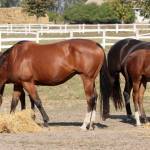Protein in Horse Diets: Aim for “Required” Levels

Horses need protein to grow and maintain health, but excess nitrogen from too much dietary protein may affect the environment adversely. Because of this, environmental advocates suggest feeding only “required” levels of protein to domesticated animals, including horses. Will deviating from tried-and-true approaches to feeding horses, particularly growing foals, negatively impact their behavior and health?
Excess nitrogen contributes to eutrophication, the process by which a body of water becomes enriched in dissolved nutrients, including nitrogen, that stimulate the growth of plants and algae.
Excessive growth of plants and algae produce foul-smelling water with reduced clarity. In turn, the ability of predatory species to find their prey is reduced, causing overpopulation of prey species and plant life. Excessive prey and plants deplete oxygen and create “dead zones” in affected bodies of water.
To determine if decreased protein intake (decreased nitrogen excretion) negatively impacts equine welfare in the form of behavioral changes, one research group from Italy fed two different diets to growing foals. Both diets provided the same level of energy, or calories, but one had 13.2% protein while the second was restricted to only 10.6% protein—the minimum daily total dietary protein level recommended by the National Research Council. The researchers subsequently evaluated foal behavior to determine if any welfare issues, manifested in the form of behavior changes, in response to the decreased dietary protein occurred.
“Behavior is a strong indicator of equine health and welfare,” noted Kathleen Crandell, Ph.D., a nutritionist with Kentucky Equine Research (KER). “In this study, providing adequate, but not excessive, protein to growing foals did not culminate in any negative behavior changes, such as less or more time in movement, resting, ingestion activities, social interaction, and development of stereotypies.”
In light of these findings, the researchers concluded that “reduction of crude protein in foal diets is reconcilable with the maintenance of performance and welfare.”
*Sartoris, C., N. Guzzo, S. Normando, et al. Evaluation of behaviour in stabled draught horse foals fed diets with two protein levels. Animal. In press.








